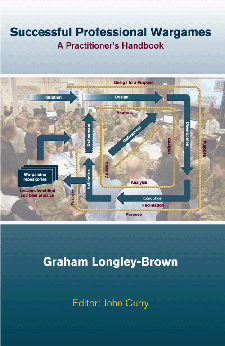The History of Wargaming Project
The project aims to make the largest possible collection of wargaming books and rules available to the modern reader. Ranging from second editions of wargaming classics, to professional wargaming rules used by the military and innovations in current wargaming.

|
|
Professional Wargaming

|
Successful Professional Wargames:
A PRACTITIONER’S HANDBOOK
Editor: John Curry |
|---|---|
|
You will benefit from this book if you are a
practitioner of the art of serious wargaming. Done well, the simple act
of putting players in an immersive environment, asking them to make
decisions and then face the consequences of those in a dynamically
evolving narrative generates astounding insights and internalises
learning objectives. Yet, as Clausewitz said of war, everything in
wargaming is simple, but doing the simplest thing is difficult. This
book explains the seemingly simple. It is a detailed guide to designing
and delivering successful wargames, whether you apply the technique to
Defence, other government departments, business, the emergency services,
academia or humanitarian operations. This is important because good
wargames save money but, first and foremost, they save lives. The author "In his book, Graham
Longley-Brown draws on his first-hand experience and those of leading
professionals around the world to tell the story of wargaming best
practices. From delving into the nature and applicability of wargames
(they’re not just for the military), to building the best teams for
producing and managing them, to articulating the life cycle of a
successful game, it is a story which will prove invaluable for
professional practitioners of wargames for both security and business. Peter Perla, author of The Art of Wargaming "This book offers a
cornucopia of invaluable information and ideas based on Graham
Longley-Brown's decades of hands-on experience in designing and running
professional wargames. There are extensive contributions from other
experts, making the book a gold mine of insights from across the global
wargaming community. It is essential reading for anyone wishing to use
this increasingly prominent analytical and educational technique. Professor Philip Sabin, author of Simulating
War "Soldiers take great
pride in being physically fit. Sport plays a major part in Army culture.
But fighting power comprises three components: physical; moral and
conceptual. The physical component is important, but the conceptual
component is the decisive and campaign-winning differentiator: in war,
the winners are the thinkers, the rest are losers. Wargaming is not only
a directed element of the military planning process, but it also
provides a fitness training programme for the brain in which every
thinking Army officer should engage. Anyone involved in military
thinking, or indeed any form of tactical or strategic thinking, from
government to business, will derive huge benefit from Graham
Longley-Brown’s excellent exploration and explanation of the (often
neglected) art of wargaming. General (Retired) Andrew Sharpe CBE This book is published by the History of Wargaming Project as part of its ongoing work to document current practise in wargaming. The book is available from Amazon and other online stores. |
|
|